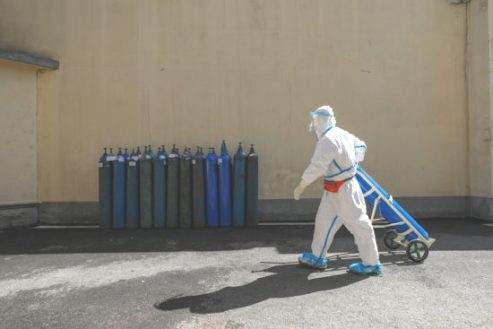Nigeria Govt Scrambles For Oxygen As COVID-19 Deaths Rise

LAGOS JULY 15TH (NEWSRANGERS)-The federal government said on Monday it is working towards getting more oxygen to attend to emergencies as cases of deaths occasioned by coronavirus keep increasing.
The Secretary to the Government of
the Federation and PTF Chairman, Boss Mustapha, stated this in Abuja during the
briefing of the task force.
The Presidential Task Force (PTF) on COVID-19 said the number of hospitalised
people is on the increase and the major concern of the government is to have
enough oxygen nationwide to attend to emergencies.
“An enhanced risk communication strategy becomes inevitable when we realise that within the last 24 hours, the world witnessed the largest single day cases of 230,370 while in Nigeria, last week recorded the highest weekly fatality of 70 deaths,” the SGF said.
He said there were plans to
establish one sample collection centre in each of the 774 local government
areas in the 36 states of the federation and the FCT.
Why oxygen/ventilators are important
Artificial oxygen supply is provided when a patient has low oxygen. Tanks of oxygen are used to treat people with breathing problems, a common problem faced by some COVID-19 patients. It can be introduced into the body through a nasal cannula or via a face mask and the patient then uses the oxygen to breath by his or herself.
And when the case is severe, a ventilator is deployed. Ventilator is a machine that provides mechanical ventilation by moving breathable air into and out of the lungs to deliver breaths to a patient who is physically unable to breathe, or breathing insufficiently. Ventilators, which are sometimes called respirators, are chiefly used in intensive care and emergency medicine.
In April 2020, Nigeria had only 169 ventilators in sixteen out of the 36 states of the federation, according to a tally by this newspaper but the numbers have significantly improved as both the federal and state governments have imported many of the machines. Donor agencies from within and outside Nigeria have also imported ventilators, oxygen and other equipment to support the fight against the pandemic. Some public and private universities in the country have fabricated the machines as part of their support.
‘Nigeria needs 10,000 respirators’
A respiratory expert who craved for anonymity said Nigeria requires at least 10, 000 respirators for emergency cases. According to him, the country has less than 500 ventilators at the moment, adding that it is mostly public tertiary hospitals that have them.
He said ventilators are very important equipment, not only being used for treatment of COVID-19, but other respiratory illnesses, adding that it was important for all hospitals to have them. However, Dr Ifeanyi Casmir, a public health expert said rather than focusing on oxygen supply, the presidential task force should focus on testing more Nigerians and revamping the health system from primary to tertiary level so that people could have confidence and return to visiting the hospitals.
He said most of the deaths attributed to COVID-19 were not wholly because of the virus but because most public hospitals were closed or providing skeletal services that made medical care inaccessible to the populace, especially for those with underlying ailments.
He said till date, Nigeria had not done enough
testing on COVID-19, saying less than 200, 000 people have been tested so far
out of a population of 200 million. “This represents less than 1 per cent of
the population,” he said.
Dr Casmir said the case fatality rate of COVID-19 in the country is still
between 2.5 per cent and 4 per cent while the death rate is still under 1per
cent of the reported cases.
Rather than being reactionary, he said it was time for the task force to give priority to issues based on valid data and evidence of need.
“They have not tested a reasonable
number of people. “They should rather channel the energy of contracting oxygen
supply nationwide to testing more Nigerians, boosting the moral of health
workers which is still low and revamping our health system,” he said.
Short URL: https://newsrangers.com/?p=53235

